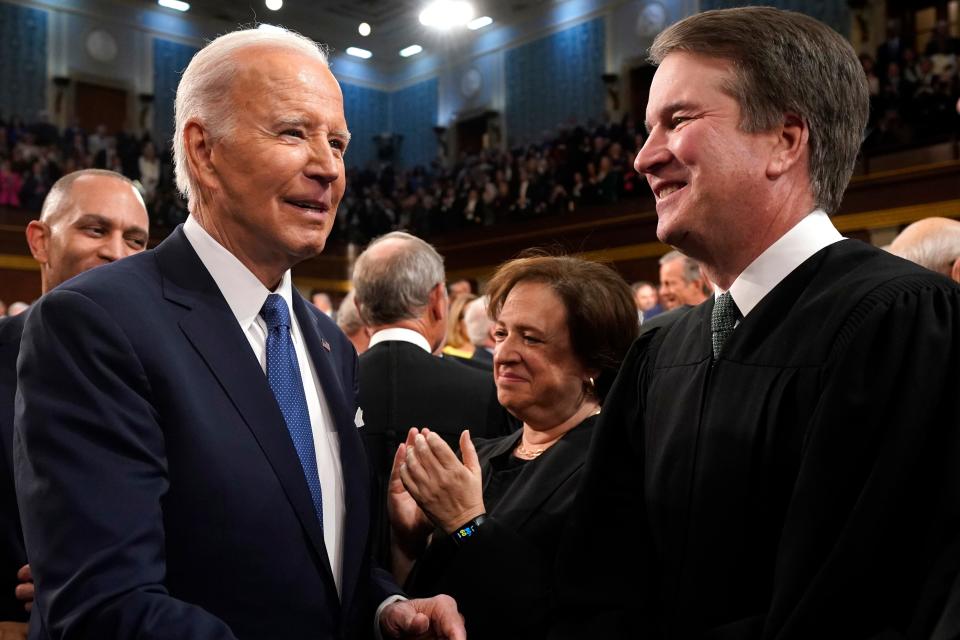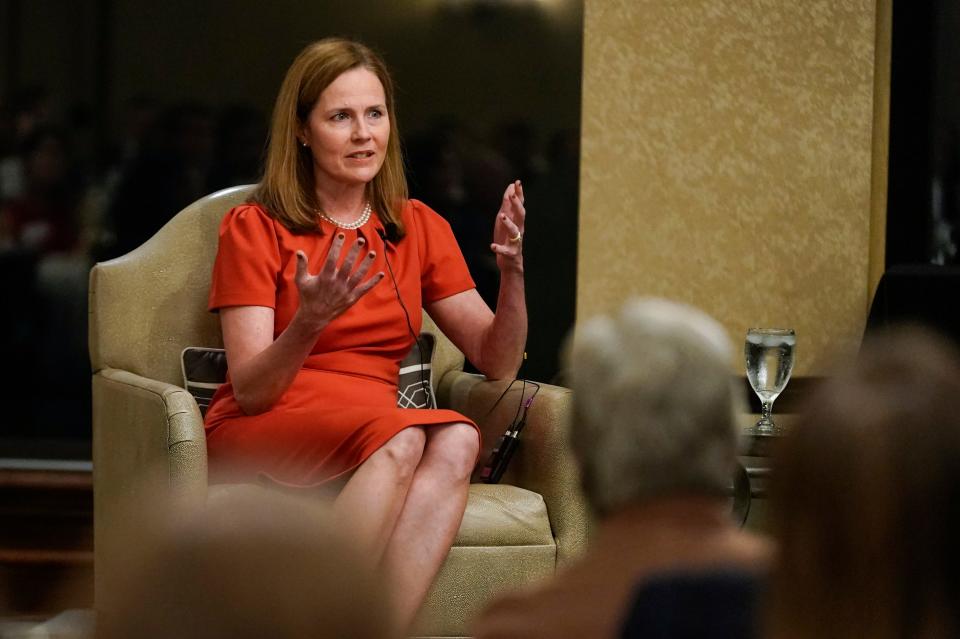A blockbuster gun rights case lands at the Supreme Court. Here are three justices to watch.
- Oops!Something went wrong.Please try again later.
- Oops!Something went wrong.Please try again later.
- Oops!Something went wrong.Please try again later.
- Oops!Something went wrong.Please try again later.
- Oops!Something went wrong.Please try again later.
WASHINGTON − With the nation reeling from the deadliest mass shooting of the year, the Supreme Court this week will hash out a Second Amendment dispute that could have enormous consequences for victims of domestic violence.
On Tuesday, the court will hear oral arguments about a law banning people who are subject to a domestic violence restraining order from owning a gun. Studies indicate that women are five times more likely to die from domestic violence if a gun is present.
The case centers on a Texas man involved in five shootings between 2020 and 2021 who pleaded guilty to a federal crime: possessing a firearm despite being the subject of a domestic violence restraining order. His appeal to the Supreme Court could have sweeping implications for other gun prohibitions.
That's because his attorneys are relying on a blockbuster Supreme Court decision from just over a year ago to challenge the constitutionality of the federal law he was charged with violating. In that case, the court ruled that gun regulations must be "consistent with this nation's historical tradition of firearm regulation" to survive court challenges. Justice Stephen Breyer, who has since retired, noted a study in his dissent about the increased risk for domestic violence victims when guns are present.
"It's common sense: Domestic abusers should not have guns," said Esta Soler, president of Futures without Violence, a group that advocates for ending domestic violence. "When guns and domestic violence mix, women and children die."
LGBTQ rights: Legal fight over gender-affirming care reaches the Supreme Court. Here's what's next.
The Supreme Court will hear arguments in the case, U.S. v. Rahimi, at 10 a.m. EST Tuesday.
Here are three justices to watch − and why − when those arguments get underway.
Kavanaugh: No 'blank check' on guns
Justice Brett Kavanaugh and Chief Justice John Roberts are always important to watch because they sit at the ideological center of the court and can swing the outcome of a case one way or the other.
That could be particularly true on guns. While both conservatives voted to knock down the New York gun licensing law at issue in Bruen, they also both signed onto a concurring opinion that spelled out some limits to that decision. Kavanaugh stressed that the court's landmark decision last year should not be read to cast doubt on prohibitions on the "possession of firearms by felons and the mentally ill."
States, Kavanaugh wrote, could still mandate licenses for gun purchases, requiring people to be fingerprinted and submit to background checks, training and mental health records checks.
Domestic violence wasn't raised in the court's opinion nor Kavanaugh's concurring opinion. Breyer noted the study in his dissent in last year's gun ruling that found a woman is five times more likely to be killed by a partner if he has access to a gun. Justice Samuel Alito asked in a concurring opinion why that was relevant to the questions resolved in Bruen.

Barrett: 'Dangerous people'
Justice Amy Coney Barrett will be important to watch because she addressed similar questions four years ago as an appeals court judge in Chicago. Barrett's position there could give the conservatives a way to rule against Rahimi while still honoring the precedent they set down last year.
"History is consistent with common sense," Barrett wrote in a dissenting opinion in 2019. "It demonstrates that legislatures have the power to prohibit dangerous people from possessing guns."
The 7th U.S. Circuit Court of Appeals case dealt with a Wisconsin man barred from owning a gun because he was convicted of felony mail fraud in a scheme to defraud Medicare. In a 2-1 decision, the appeals court upheld laws that barred the man from owning a gun because of his conviction. Barrett dissented, writing that people can't be denied rights just because they are felons but that people deemed dangerous might be out of luck.
Eighteen months after Barrett's opinion appeared, President Donald Trump nominated her to the Supreme Court.

Thomas: In search of 'original meaning'
Justice Clarence Thomas is often considered the Supreme Court's foremost proponent of originalism, the practice of interpreting the words of the Constitution as they would have been understood by the framers at the time of the nation's founding. It was Thomas who wrote the majority opinion in Bruen, holding that gun restrictions must be "consistent with this nation's historical tradition of firearm regulation" in order to survive a legal challenge.
Thomas, who almost always asks the first question in arguments these days, will be closely watched for any sign of attempting to square his originalist ideology with the government's defense of the law on restraining orders.
Critics say the Rahimi case pokes a hole in the wisdom of attempting to understand what the framers had in mind when the Second Amendment was adopted in 1791. Back then, after all, women had fewer legal rights and guns were rarely used in domestic disputes, according to a brief in the case filed by 18 legal historians.
"If domestic violence in the eighteenth century had been strongly linked to firearms, such violence could have and almost certainly would have been regulated as a threat to the public peace," the historians told the court this year.
Related: Guns in America: Supreme Court agrees to hear challenge to Trump-era ban on bump stocks
This article originally appeared on USA TODAY: Thomas, Kavanaugh, Barrett: Who to watch in epic Second Amendment case

